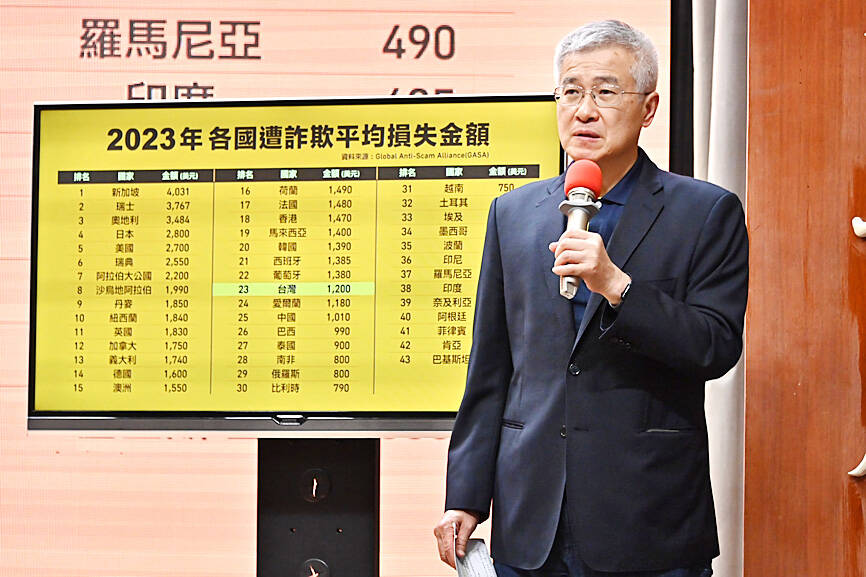A bill tackling fraud committed through the use of generative artificial intelligence (AI) technology would be submitted to the legislature for deliberation by the end of next month, the Ministry of the Interior said yesterday.
Chinese Nationalist Party (KMT) Legislator Ko Ju-chun (葛如鈞) recently urged awareness of AI-generated content in a plenary session by asking Premier Chen Chien-jen (陳建仁) to tell which of two videos he showed was false. Both videos turned out to be false.
Fraud has caused serious financial losses to countries around the world, Anti-Fraud Office Director Lee Hsien-ming (李憲明) said.

Photo courtesy of the Executive Yuan
In terms of average losses per person last year, the top three countries were Singapore, Switzerland and Austria, with each victim reporting losses of US$4,031, US$3,767 and US$3,484 on average, statistics from the International Anti-Fraud Alliance (IAFA) showed.
Taiwan ranked 23rd in this regard, with average losses of US$1,200.
In terms of financial losses due to fraud as a share of GDP, the top three developing nations were 4.5 percent in Kenya, 3.6 percent in Vietnam, and 3.2 percent in Brazil and Thailand respectively, IAFA statistics showed.
Taiwan, which reported 0.8 percent, ranked 14th.
The UK on March 11 and 12 held the world’s first Global Fraud Summit, in which ministerial-level officials from seven major industrial countries (G7), the intelligence sharing alliance “Five Eyes,” as well as Singapore and South Korea, convened to address this important global issue, Lee said.
Next week, the Ministry of the Interior and the Ministry of Foreign Affairs are to jointly hold an international fraud prevention seminar, he said.
Lee said the Ministry of the Interior is drafting a special anti-fraud law and is scheduled to submit it to the Legislative Yuan late next month.
Cabinet spokesperson Lin Tze-luen (林子倫) said that the Executive Yuan has asked the Ministry of the Interior to take charge of gathering input on anti-fraud measures from various ministries, drafting an anti-fraud law and other supporting measures.
“We hope to achieve the goal of curbing fraud through these actions,” Lin said.

CHANGING LANDSCAPE: Many of the part-time programs for educators were no longer needed, as many teachers obtain a graduate degree before joining the workforce, experts said Taiwanese universities this year canceled 86 programs, Ministry of Education data showed, with educators attributing the closures to the nation’s low birthrate as well as shifting trends. Fifty-three of the shuttered programs were part-time postgraduate degree programs, about 62 percent of the total, the most in the past five years, the data showed. National Taiwan Normal University (NTNU) discontinued the most part-time master’s programs, at 16: chemistry, life science, earth science, physics, fine arts, music, special education, health promotion and health education, educational psychology and counseling, education, design, Chinese as a second language, library and information sciences, mechatronics engineering, history, physical education

The Chinese military has boosted its capability to fight at a high tempo using the element of surprise and new technology, the Ministry of National Defense said in the Quadrennial Defense Review (QDR) published on Monday last week. The ministry highlighted Chinese People’s Liberation Army (PLA) developments showing significant changes in Beijing’s strategy for war on Taiwan. The PLA has made significant headway in building capabilities for all-weather, multi-domain intelligence, surveillance, operational control and a joint air-sea blockade against Taiwan’s lines of communication, it said. The PLA has also improved its capabilities in direct amphibious assault operations aimed at seizing strategically important beaches,

‘MALIGN PURPOSE’: Governments around the world conduct espionage operations, but China’s is different, as its ultimate goal is annexation, a think tank head said Taiwan is facing a growing existential threat from its own people spying for China, experts said, as the government seeks to toughen measures to stop Beijing’s infiltration efforts and deter Taiwanese turncoats. While Beijing and Taipei have been spying on each other for years, experts said that espionage posed a bigger threat to Taiwan due to the risk of a Chinese attack. Taiwan’s intelligence agency said China used “diverse channels and tactics” to infiltrate the nation’s military, government agencies and pro-China organizations. The main targets were retired and active members of the military, persuaded by money, blackmail or pro-China ideology to steal

The High Prosecutors’ Office yesterday withdrew an appeal against the acquittal of a former bank manager 22 years after his death, marking Taiwan’s first instance of prosecutors rendering posthumous justice to a wrongfully convicted defendant. Chu Ching-en (諸慶恩) — formerly a manager at the Taipei branch of BNP Paribas — was in 1999 accused by Weng Mao-chung (翁茂鍾), then-president of Chia Her Industrial Co, of forging a request for a fixed deposit of US$10 million by I-Hwa Industrial Co, a subsidiary of Chia Her, which was used as collateral. Chu was ruled not guilty in the first trial, but was found guilty